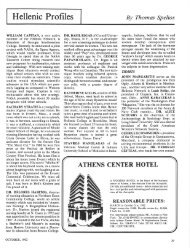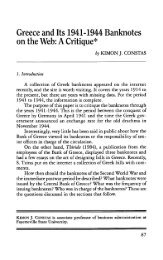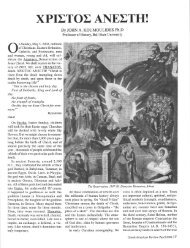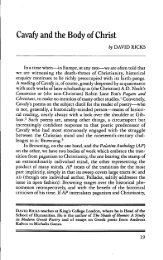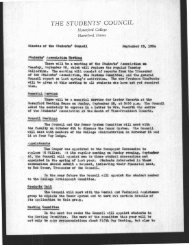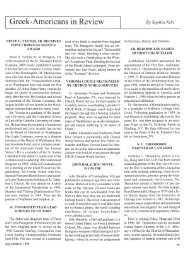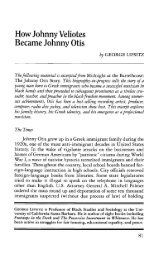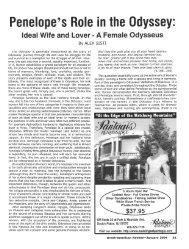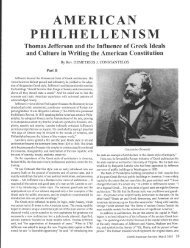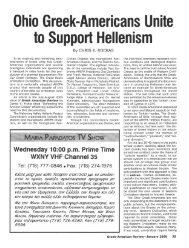The History Man
The History Man
The History Man
You also want an ePaper? Increase the reach of your titles
YUMPU automatically turns print PDFs into web optimized ePapers that Google loves.
28 JOURNAL OF THE HELLENIC DIASPORA<br />
strate that the metaphor is also present in the poetry. This is in effect an<br />
imaginative treatment of Cavafy parallel to Eliot's of the Thames or<br />
Seferis's of the Aegean: namely, to integrate the poetry into a preexisting<br />
mythical pattern. <strong>The</strong> crucial difference remains that Eliot, Seferis, and<br />
Joyce themselves reveal this process as an organizing force within their<br />
texts, while there is no real evidence that Cavafy's texts, singly or as a<br />
whole, attempt this kind of integration. Myth in this reading of Cavafy<br />
becomes a "way of controlling and ordering" Cavafy's texts, rather than<br />
a device used within the texts for the controlling and ordering of history<br />
or personal experience.'<br />
We must now turn to those poems of Cavafy which make explicit use<br />
of myth; and, like the "moral allegory" poems, these turn out to be far<br />
fewer in number than might have been supposed from the importance<br />
given to this element in Cavafy criticism. Allowing for a somewhat<br />
generous definition of myth, that includes stories of literary origin either<br />
based ultimately on mythical sources or having acquired a currency and<br />
symbolic status since first being written which goes far beyond their<br />
explicit historical context, or both, there are no more than twelve of these<br />
poems, of which two have already been encountered under the heading<br />
of "moral allegory." 4 All were written very early in Cavafy's career, in<br />
the decade between 1893 and 1903 (assuming the dating of 1894 for the<br />
3Both Keeley and Dallas bracket the name of Eliot with that of Ezra Pound in<br />
their comparisons with Cavafy. It does not seem to have been noticed that Pound<br />
comes significantly doser to Cavafy's perception of history than any of his Englishlanguage<br />
contemporaries. <strong>The</strong> Cantos stand as a monument to the attempt to treat<br />
history, in all its random diversity, as the raw material for myth; an attempt which<br />
is finally seen in the text as a qualified failure ("does it cohere?"). And there is<br />
probably nothing in English poetry that so closely approximates Cavafy's intense<br />
feeling for the past as part, as do such early poems of Pound as "Papyrus,"<br />
"Provincia Deserta," and "Near Perigord." <strong>The</strong> final lines of "Provincia Deserta,"<br />
in which the poet traverses the landscape in which the Provençal troubadours once<br />
sung and which lives in their songs, could serve as an epigraph for all of Cavafy's<br />
historical poetry:<br />
So ends that story.<br />
That age is gone;<br />
Pieire de Maensac is gone.<br />
I have walked over these roads;<br />
I have thought of them living.<br />
4"Priam's Night Journey" (1893: Anekdota, 51); "Salome" (1896: Anekdota,<br />
87); "Chaldaean Picture" (1896: Anekdota, 89); "<strong>The</strong> Horses of Achilles" (1896/<br />
1897: A113, tr. 5); "Lohengrin" (1898: Anekdota, 103); "Suspicion" (1898:<br />
Anekdota, 107); "<strong>The</strong> Funeral of Sarpedon" (1898?/1908: A111, tr. 7); "King<br />
Claudius" (1899: Anekdota, 113, tr. 134); "When the Watchman Saw the Light"<br />
(1900: Anekdota, 123, tr. 137); "Bad Faith" (1903/1904: A109, tr. "Unfaithfulness,"<br />
13). It should be noted that only three poems out of this list were ever<br />
published by Cavafy. In addition to the above, the following two poems from the<br />
previous list refer to the mythical rather than the historical past, as the basis for<br />
moral allegory: "Ithaca" (1894 ?/1910/1911) and "Interruption" (1900/1901).



